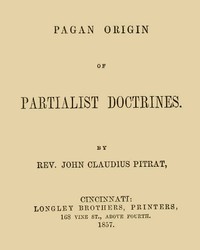Pagan Origin of Partialist Doctrines by John Claudius Pitrat
"Pagan Origin of Partialist Doctrines" by John Claudius Pitrat is a historical and theological work written in the mid-19th century. The text explores the concept that various doctrines held by Partialists, particularly in the Christian faith, have their origins rooted in pagan beliefs and practices. Pitrat aims to unveil these connections through historical analysis and scriptural examination, emphasizing the impacts on modern religious understandings. The opening of the book sets the tone
for an in-depth exploration of the relationship between Pagan religions and Partialist doctrines. It begins by presenting two key arguments that will be developed throughout the text: one based on scriptural analysis and the other on historical evidence. Pitrat lays out the foundations for his examination by discussing the universal worship of nature in ancient civilizations, asserting that these practices significantly shaped later religious beliefs, including concepts found in Christianity. Notably, he offers the perspective that the rituals and beliefs surrounding Pagan mysteries influenced the development of certain Christian doctrines, a theme that he promises to elaborate on in subsequent chapters in his work. (This is an automatically generated summary.)
Read or download for free
| How to read | Url | Size | |||
|---|---|---|---|---|---|
| Read now! | https://www.gutenberg.org/ebooks/43630.html.images | 388 kB | |||
| EPUB3 (E-readers incl. Send-to-Kindle) | https://www.gutenberg.org/ebooks/43630.epub3.images | 163 kB | |||
| EPUB (older E-readers) | https://www.gutenberg.org/ebooks/43630.epub.images | 166 kB | |||
| Kindle | https://www.gutenberg.org/ebooks/43630.kf8.images | 269 kB | |||
| older Kindles | https://www.gutenberg.org/ebooks/43630.kindle.images | 235 kB | |||
| Plain Text UTF-8 | https://www.gutenberg.org/ebooks/43630.txt.utf-8 | 357 kB | |||
| Download HTML (zip) | https://www.gutenberg.org/cache/epub/43630/pg43630-h.zip | 145 kB | |||
| There may be more files related to this item. | |||||
About this eBook
| Author | Pitrat, John Claudius |
|---|---|
| Title | Pagan Origin of Partialist Doctrines |
| Credits | E-text prepared by Carlos Colon, Princeton Theological Seminary Library, and the Online Distributed Proofreading Team (www.pgdp.net) from page images generously made available by Internet Archive (archive.org) |
| Reading Level | Reading ease score: 60.7 (8th & 9th grade). Neither easy nor difficult to read. |
| Language | English |
| LoC Class | BX: Philosophy, Psychology, Religion: Christianity: Churches, Church movements |
| Subject | Catholic Church -- Controversial literature |
| Subject | Universalism |
| Subject | Future punishment |
| Category | Text |
| EBook-No. | 43630 |
| Release Date | Sep 3, 2013 |
| Most Recently Updated | Oct 23, 2024 |
| Copyright Status | Public domain in the USA. |
| Downloads | 226 downloads in the last 30 days. |
| Project Gutenberg eBooks are always free! | |

